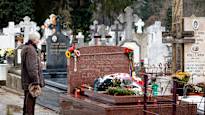To the day, 35 years ago, Finns also watched the escape of the Ceaușescu couple during the Romanian revolution on their televisions. Now some Romanians miss them back.
BUCHAREST Sixty thousand dead. A nation robbed of poverty. Homes destroyed in the way of megalomaniacal city plans.
The Romanian dictator was found to be the cause of all this Nicolae Ceaușescu and his wife Elena in 1989. A show trial was held to convict them, at the end of which they were executed.
Still, an ever-increasing number of Romanians yearn back to the time of the Ceaușescus. The explanation is the same as for many people who grew up in the former East Germany, or the GDR: people felt that they belonged more strongly to society at that time and life was more predictable in the socialist command economy than it is now.
There are reasons other than nostalgia.
Prices have also risen in Romania. The already poor Romanians are disappointed with the current ruling parties, which have failed to help them, even though it has been 35 years since the revolution.
“We are at a crossroads”
Romania is now very badly divided, political science professor Sergiu Miscoiu Babeș-Bolyai University explains to the news agency Reuters. According to him, the far-right parties benefit from the fact that the Constitutional Court decided to annul the presidential election in early December.
– I don’t usually use hyperbole, but now we really are at a crossroads. There is no longer one Romania but several. The parties hate each other and fight through the institutions, Mișcoiu explains.
The dividing line goes between urban and rural, and between young and old people.
– More than 40 percent of the country’s population lives in rural areas. They are disappointed with the actions of the largest party, the Social Democrats, after the fall of communism and feel that they have been betrayed when the promised investments in the countryside have not been made.
The division was also visible in the recent presidential elections, which were canceled by the Constitutional Court at the beginning of December. The far-right, anti-democratic candidate had become the clear favorite in the second round Călin Georgescu.
Read more: The group spent hundreds of thousands of euros on the campaign of a pro-Russian presidential candidate in Romania
“People miss traditions”
20 years old Mara Potsakan sitting on a park bench in the center of Bucharest. He comes from the Transylvanian rural town of Sibiu.
Next to it rises the palace of the Ceaușescu-era Central Committee, from the roof of which the couple took a helicopter to escape the revolution and the raging people. Tourists take selfies on its steps.
The landmarks of the Ceaușescus have become tourist destinations.
Potsakan’s parents have told him horror stories from the time of the Ceaușescus. Still, they voted in the first round for the far-right Georgescu, who threatened to abolish the current parties if he gets into power.
– It’s about identity. Georgescu promises to restore Romanian traditions and prevent, for example, the improvement of the rights of sexual and gender minorities, Potsakan explains.
The Potsakani family also describes the division of generations: Mara herself says that she voted for a centre-right, pro-EU and NATO candidate in the first round Elena Lasconia.
It’s busy at the Ceaușescu tomb
Ceaușescu is buried in the Ghencea cemetery near the heart of Bucharest.
In the years after the revolution, there was only a small, inconspicuous wooden cross on the grave, but the couple’s family has replaced it with an impressive stone grave a few years ago.
Many people stop at the grave, make the sign of the cross or take off their hats on Christmas Sunday. According to the Romanian media, the tomb is especially the destination of many former elite members’ pilgrimages.
A middle-aged man lights a small candle on the grave. He introduces himself as a biology teacher and does not want to reveal his name, because respecting the Ceaușescus’ grave is not acceptable to everyone.
How were things better 35 years ago?
– Then there was a clear direction, he says.
